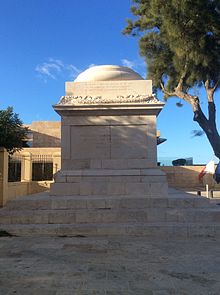Ponsonby's Column


Ponsonby's Column, also known as Ponsonby's Cenotaph,[2] was a monumental column in Valletta, Malta. It was built in 1838 as a memorial to Major-General Sir Frederick Cavendish Ponsonby, a former Governor of Malta, but it was destroyed by lightning in 1864. Its plinth survived, and is now located near Hastings Gardens.[3]
History
[edit]Major-General Sir Frederick Cavendish Ponsonby, an Anglo-Irish aristocrat, was appointed Governor of Malta on 15 February 1827. While Ponsonby was in England in 1836, he resigned from the post of Governor, and died suddenly on 11 January of the following year.[4][5][6]
In 1838, a column was built in honour of the dead Governor on St. Andrew's Bastion, overlooking Marsamxett Harbour.[4][5] Its architect is not known, but it could have been designed by Giorgio Pullicino.[7] The monument consisted of a 70-foot-high Doric column on a plinth,[5] surmounted by an urn.[4] The main inscription read:[4][6]
FREDERICO CAVENDISH PONSONBY
MELITAE AN. IX. PRAEFECTO
CIVIUM AMOR
MDCCCXXXVIII

In January 1864, the column was struck by lightning,[5] and it was subsequently demolished.[4][6] The plinth remained intact, but in November 1888 it was removed from St. Andrew's Bastion to make way for new gun emplacements on the bastion. The plinth was reassembled near Hastings Gardens on St. Michael's Bastion, and the following inscription was added:[4][6]
THE COLUMN 70 FEET HIGH ERECTED ON THIS BASE
TO THE MEMORY OF SIR FREDERICK PONSONBY
WAS DESTROYED BY LIGHTNING IN JANUARY 1864
The plinth was damaged by shrapnel during aerial bombardment in World War II. It was restored a number of times over the years, most recently in 2013 under the sponsorship of the Bank of Valletta.[7] The plinth is listed as a Grade 1 national monument by MEPA.[8]
See also
[edit]References
[edit]- ^ Guillaumier, Alfie (2005). Bliet u Rħula Maltin. Klabb Kotba Maltin. p. 1066. ISBN 99932-39-40-2.
- ^ "Exploring Valletta's treasures". Timesofmalta.com. 29 May 2011. Retrieved 27 December 2017.
- ^ Cassar, M. (2018, December 9). Every picture tells a story (1): Marsamxett in the 1850s. The Sunday Times of Malta, pp. 59.
- ^ a b c d e f Simpson, Donald H. (1958). "Some public monuments of Valletta 1800–1955" (PDF). Melita Historica. 2 (3): 156–157.
- ^ a b c d Z., T. (1928). "Il-Belt (Valletta)" (PDF). Il-Malti (in Maltese). 2 (1) (2 ed.). Il-Ghaqda tal-Kittieba tal-Malti: 34–35. Archived from the original (PDF) on 17 April 2016.
- ^ a b c d Guillaumier, Alfie (2005). Bliet u Rħula Maltin. Klabb Kotba Maltin. p. 1068. ISBN 99932-39-40-2.
- ^ a b Said, Edward (26 January 2014). "The lost landmarks of Malta: Ponsonby's Column". Architecture XV. Archived from the original on 6 July 2018.
- ^ "One World - Protecting the most significant buildings, monuments and features of Valletta (32) - Ponsomby's Column". Times of Malta. 2 August 2008. Retrieved 4 September 2015.
External links
[edit]- "Lost Landmarks of Malta - Ponsonby's Column". Axv.com.mt. 7 April 2016. Retrieved 27 December 2017.
- Monumental columns
- Buildings and structures in Valletta
- Monuments and memorials in Malta
- Neoclassical architecture in Malta
- Buildings and structures completed in 1838
- Buildings and structures demolished in 1864
- Demolished buildings and structures in Malta
- 1838 establishments in Malta
- 1864 disestablishments in Malta

